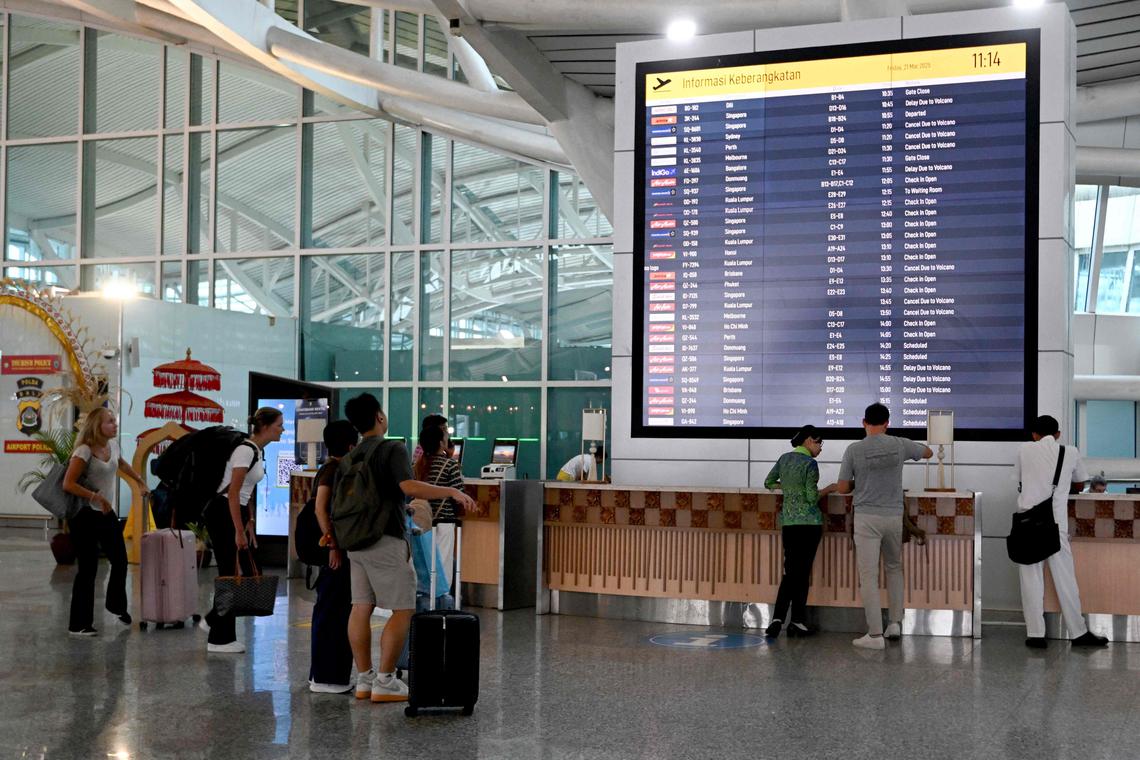Indonesia on alert as Covid-19 surges across Asia
Sign up now: Get insights on Asia's fast-moving developments

Travellers entering Indonesia must submit their recent travel history and health information via the Satusehat Health Pass.
PHOTO: AFP
JAKARTA - As several Asian territories grapple with a resurgence of Covid-19, the Indonesian government has assured the public that the country’s health sector is well prepared to handle any future outbreaks, while the authorities ramp up precautionary measures to prevent a domestic surge.
“The Health Ministry has transformed the health sector and better prepared health facilities, workers and laboratories (for future crises, thanks to the lessons learnt from the previous Covid-19 pandemic),” ministry spokesman Aji Muhawarman told The Jakarta Post on May 21. “Whether it is Covid-19 or another threat, Indonesia is ready to face it.”
Thailand, Singapore and Hong Kong recorded in the past few weeks massive upticks in Covid-19 transmissions, sparking concerns about possible regional spillover.
In spite of concerns, Mr Aji emphasised that the situation in Indonesia remains stable, with daily new Covid-19 infections consistently in the single digits since December 2024, based on Health Ministry data.
Nonetheless, the government is tightening controls at entry points such as airports and seaports. Incoming travellers are now required to submit their recent travel history and health information via the Satusehat Health Pass, an electronic declaration form introduced to bolster border surveillance.
Domestically, the ministry continues to rely on the Early Warning and Response System (SKDR), which gathers reports from health facilities across the country to monitor and respond to potential outbreaks.
“We are not conducting mass screening but the SKDR system, which has been implemented for a while, allows (the ministry) to receive data and reports from health facilities such as hospitals and laboratories that have been designated to test disease samples and treat patients,” Mr Aji said.
He urged the public, especially the elderly and individuals with comorbidities, to get Covid-19 booster shots. While around three-quarters of the country’s population have received two doses of the Covid-19 primary vaccine, only 39 per cent have received a booster, and just 2 per cent have had a second booster.
Tracing remains key
Dr Riris Andono Ahmad, an epidemiologist at Yogyakarta’s Gadjah Mada University, said that with Covid-19 now considered an endemic disease akin to the seasonal flu in many countries, the government should continually strengthen its tracing efforts, in addition to developing a public health response strategy that allows for rapid deployment of resources in case of a surge.
“Indonesia doesn’t need to stay on high alert constantly. That is costly and would not be sustainable. But the country must be ready to act fast and deploy the necessary resources to keep the public resilient against the virus,” he said on May 21.
Epidemiologist Dicky Budiman of Griffith University, Australia, urged the Indonesian government to step up case tracing and genomic sequencing efforts as the recent wave of infections abroad, which is driven by new sub-variants of the JN.1 strain, shows that the coronavirus and its ongoing mutations still pose a threat to public health.
The JN.1 strain, a sub-lineage of Omicron, is more transmissible but not more severe than earlier variants.
“Covid-19 will continue to evolve. (New variants) are unlikely to be more deadly, but probably more transmissible and resistant,” Dr Dicky said on May 21. “The world is not free (from the threat of another) pandemic if the detection and surveillance efforts of any countries, including Indonesia, remain lacklustre.”
Historical treaty
Among the hardest-hit nations in the current wave is Thailand, which reported more than 71,000 cases and 19 deaths between Jan 1 and May 14, according to The Nation newspaper.
Singapore recorded 25,000 new cases in just two weeks between mid-April and early May. Meanwhile, Hong Kong’s positivity rate has climbed to 13.6 per cent, the highest in a year.
In response to global health vulnerabilities, member states of the World Health Organisation (WHO) on May 20 adopted a landmark Pandemic Agreement during the World Health Assembly
The treaty aims to prevent a repeat of the disjointed global response seen in the early days of the pandemic by strengthening international coordination, surveillance and equitable vaccine access.
“The agreement is a victory for public health, science and multilateral action. It will ensure we, collectively, can better protect the world from future pandemic threats,” said WHO director-general Tedros Adhanom Ghebreyesus. THE JAKARTA POST/ASIA NEWS NETWORK


